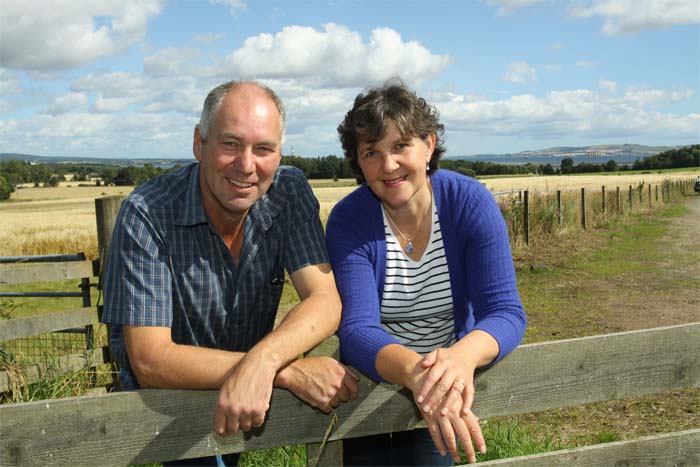
Black Isle growers Brian and Caroline Matheson from Ballicherry Farm in Balblair have been selected as the new Arable East Highland Monitor Farm in a new joint venture project between HGCA and Potato Council.
Joining the Mathesons on the three-year AHDB project is Grant Cuthill, farm manager for John Gordon at neighbouring Rosefarm which rents land from the Mathesons as part of its 3,000 tonne Pre-Basic seed potato enterprise.
The project is being financed by HGCA, with additional funding being made available through the Scotland Rural Development Programme, which is jointly funded by the Scottish Government and the European Union.
Ballicherry Farm is a mixed enterprise of 190 hectares of spring barley grown for certified seed and malting, 42 hectares of winter wheat grown for certified seed and 25 hectares of oilseed rape together with 100 ewes, 100 over-wintered cattle and 25 suckler cows.
The farm also carries out contracting operations, specialising in carrot growing and mobile grain dressing for Scotgrain, as well as a care farming business which is run by Caroline, a Registered Nurse and midwife.
Gavin Dick, HGCA Regional Manager Scotland, said the East Highland Monitor Farm would be supported by a community group to ensure it is ‘run by farmers for farmers’.
“Whilst the focus at Ballicherry is growing malting barley, both for seed and malt, it is nevertheless a relatively complex family farming business, and one of the unique
opportunities of this project will be to get local growers involved in discussing how the different enterprises are integrated, as well as how they contribute to the overall business.
“This will help give the community group the skills and knowledge to look at their own businesses and identify opportunities to improve their own efficiency,” he said.
This view is echoed by Brian Matheson at Ballicherry who adds “We started as a small business and over time have become well established, but we are incredibly busy which means that sometimes you lack the time to take stock.
“Encouraging local growers to help us examine the business will help us make better informed decisions and hopefully means they can do something along the same lines for their own enterprises.”
The Monitor Farm idea also appealed to Caroline who was keen to extend the principles of her nursing training to the farm: “Sitting down regularly with your peers and other experts to learn from their experiences and to share knowledge is key to continuing professional development.
“This project gives us a great opportunity to do that with the farm, and hopefully will encourage local farmers to develop their own discussion and advice network,” she added.
For Rosefarm farm manager Grant Cuthill, being part of the Arable Monitor Farm project will help the business get a better grip on production costs: “Opening up your business for others to scrutinise is challenging, as you have to be prepared to take the criticism as well as the positives, but hopefully everyone will take away something to help them improve.
“No one gets it right all the time, and like many other growers, we are constantly looking for ways we could reduce the costs of labour, machinery and energy.
Joining the project will help us benchmark the business in terms of our output and profitability – in other words are the potatoes leaving a good enough margin to allow for reinvestment and profitability ? If not, what can we do about it?”
“We would also like to explore how to better cope with the loss of key chemicals which is a headache for the industry as a whole.”
Claire Hodge, Technical Executive for Potato Council in Scotland, has been working with HGCA to identify the monitor farms and says “The seed potato industry adds around £100m to the Scottish economy. Maintaining high quality, high health seed potatoes is vital to maintain investment and sustainability in the wider potato industry. Having a specialist seed potato grower as part of the Monitor Farm project will be an excellent boost for knowledge sharing and best-practice.”
